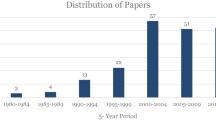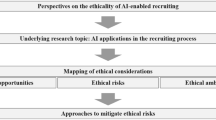Abstract
Recruitment is the process of finding, assessing and selecting new personnel, which many organisations does manually or use a standalone system. As the requirements or functionalities such as classification of skill-sets and mapping of profile with job specification increases, it become difficult to achieving the objectives through the current systems, manual or standalone. This has become a problem for many Universities, and hampers central coordination of recruitment activities, such as search for appropriateness and assessments of students and faculty members’ skill-sets and capabilities to undertake roles and responsibilities. The challenge gets worst when students and faculty members are spread across universities or countries, in that, other factors, such as culture and language, which can be of influence, have to be considered. Therefore, a collaboration between universities in different countries need to develop a system that can address the factors of influence in a recruitment system. Thus, the objectives of the study were to examine and understand the factors that influences recruitment system, and develop a web-based recruitment system using virtual team. The use of virtual team was primarily to imbibe culture from different countries. In achieving the objectives of the study, the qualitative methods was followed, in which a case (virtual team), which consisted of participants from three countries were employed. Thus, qualitative data were collected using open-questionnaire, and the data was interpretively analysed. Based on the analysis of the data, three factors, technology, culture and governance were found to be of critical influence to the development of software, by using a virtual team. Each of these factors has a fundamental contribution to the success or failure of collaborative software development, as they manifests through various elements.

Similar content being viewed by others
References
Alan, B. (2015). Social Research Methods. 5th edn. New York: Oxford University Press.
Amusan, D. G., & Oyediran, M. O. (2016). Development of Efficient E-Recruitment System for University Staff in Nigeria. Circulation in Computer Science, 1(1), 10–14.
Bass, J. M. (2014). Scrum master activities: process tailoring in large enterprise projects. In Global Software Engineering (ICGSE), 2014 I.E. 9th International Conference on (pp. 6–15). IEEE.
Becker, K., & Smidt, M. (2015). Workforce-related risks in project with a contingent workforce. International Journal of Project Management, 33(4), 889–900.
Carter, D. R., Seely, P. W., Dagosta, J., Dechurch, L., & Zaccaro, S. J. (2015). Leadership for global virtual teams: Facilitating teamwork processes. In J. L. Wildman & R. L. Griffith (Eds.), Leading global teams (pp. 225–252). New York: Springer.
Charlier, S. D., Stewart, G. L., Greco, L. M., & Reeves, C. J. (2016). Emergent leadership in virtual teams: A multilevel investigation of individual communication and team dispersion antecedents. The Leadership Quarterly, 27(5), 745–764.
Dayyala, N., Bagchi, K., & Mandal, P. (2017). Software development productivity in different sourcing arrangements. In P. Mandal & J. Vong (Eds.), Entrepreneurship in technology for ASEAN (pp. 111–125). Singapore: Springer.
Faliagka, E., Iliadis, L., Karydis, I., Rigou, M., Sioutas, S., Tsakalidis, A., & Tzimas, G. (2014). On-line consistent ranking on e-recruitment: Seeking the truth behind a well-formed CV. Artificial Intelligence Review, 42(3), 515–528.
Fuggetta, A., & Di Nitto, E. (2014). Software process. In Proceedings of the on Future of Software Engineering (pp. 1–12). Hyderabad: ACM.
Ghafoor, F., Shah, I. A., & Rashid, N. (2017). Issues in adopting agile methodologies in global and local software development: A systematic literature review protocol with preliminary results. International Journal of Computer Applications, 160(7), 37–41.
Gilson, L. L., Maynard, M. T., Young, N. C. J., Vartiainen, M., & Hakonen, M. (2015). Virtual teams research: 10 years, 10 themes, and 10 opportunities. Journal of Management, 41(5), 1313–1337.
Greiner, B. (2015). Subject pool recruitment procedures: Organizing experiments with ORSEE. Journal of the Economic Science Association, 1(1), 114–125.
Gunawardana, P. D. A. (2015). eRecruitment System for Global Management Consultancy. University of Colombo School of Computing (UCSC) Digital Library (DL).
Hammarberg, K., Kirkman, M., & De Lacey, S. (2016). Qualitative research methods: When to use them and how to judge them. Human Reproduction, 31(3), 498–501.
Javdani, G. T., Zulzalil, H., Ghani, A. A., Sultan, A. B. M., & Sharif, K. Y. (2014). How human aspects impress agile software development transition and adoption. International Journal of Software Engineering and Its Applications, 8(1), 129–148.
Jean, G., & Simard, D. (2013). Deductive versus inductive grammar instruction: Investigating possible relationships between gains, preferences and learning styles. System, 41(4), 1023–1042.
Johnston, M. P. (2014). Secondary data analysis: A method which the time has come. Qualitative and Quantitative Methods in Libraries, 3(3), 619–626.
Kasemsap, K. (2016). Examining the roles of virtual team and information technology in global business. In C. Graham (Ed.), Strategic management and leadership for system development in virtual spaces. Hershey (pp. 1–21). IGI Global.
Kaur, R., & Sengupta, J. (2011). Software Process Models and Analysis on Failure of Software Development Projects. International Journal of Scientific & Engineering Research, 2(2), 1–4.
Klitmøller, A., & Lauring, J. (2013). When global virtual teams share knowledge: Media richness, cultural difference and language commonality. Journal of World Business, 48(3), 398–406.
Leonor, S. (2015). Virtual R&D Teams: A New Model for Product Development. International Jornal of innovation, 3(2), 1–27.
Lilian, S. C. (2014). Virtual teams: Opportunities and challenges for e-leaders. Procedia - Social and Behavioral Sciences, 110, 1251–1261.
Marshall, C., & Rossman, G. B. (2014). Designing qualitative research (6th ed.). Thousands Oaks: Sage Publication.
Moe, N. B., Cruzes, D. S., Dyba, T., & Engebretsen, E. (2015). Coaching a Global Agile Virtual Team. In Proceedings of the 10th International Conference on Global Software Engineering, ICGSE (pp. 33–37).
Murgia, A., Tourani, P., Adams, B., & Ortu, M. (2014). Do developers feel emotions? an exploratory analysis of emotions in software artifacts. In Proceedings of the 11th Working Conference on Mining Software Repositories (pp. 262–271). ACM.
Owais, M., & Ramakishore, R. (2016). Effort, Duration and Cost Estimation in Agile Software Development. In Proceedings of the Ninth International Conference on Contemporary Computing (IC3) (pp. 1–5). Delhi.
Paasivaara, M., Heikkilä, V., Lassenius, C., & Toivola, T. (2014). Teaching students scrum using LEGO blocks. In Companion Proceedings of the 36th International Conference on Software Engineering (pp. 382–391). ACM.
Pabón, O. H. P., González, F. A., Aponte, J., Camargo, J. E., & Calle, F. R. (2016). Finding relationships between socio-technical aspects and personality traits by mining developer e-mails. In Proceedings of the 9th International Workshop on Cooperative and Human Aspects of Software Engineering-CHASE ‘16 (pp. 8–14). IEEEe.
Palacios, R. C., Lumbreras, C. C., Acosta, P. S., Penalvo, F. J. G., & Tovar, E. (2014). Project managers in global software development teams: A study of the effects on productivity and performance. Software Quality Journal, 22(1), 3–19.
Patil, N., Patil, L., Wagh, G., & More, M. S. (2017). Candidate recruitment system by using keyword based searching. International Research Journal of Engineering and Technology, 4(3), 24–26.
Pinjani, P., & Palvia, P. (2013). Trust and knowledge sharing in diverse global virtual teams. Information Management, 50(4), 144–153.
Taylor, R. R. (2017). Kielhofner’s research in occupational therapy: Methods of inquiry for enhancing practice (2nd ed.). Chicago: Davis, F.A.
Turk, D., France, R., & Rumpe, B. (2014). Assumptions Underlying Agile Software Development Processes. Journal of Database Management, 16(4), 62–87.
Vijayasarathy, L. R., & Butler, C. W. (2016). Choice of software development methodologies: Do organizational, project, and team characteristics matter? IEEE Software, 33(5), 86–94.
Yilmaz, M., Yilmaz, M., Connor, R. V. O., & Clarke, P. (2016). A gamification approach to improve the software development process by exploring the personality of software practitioners. In International Conference on Software Process Improvement and Capability Determination (pp. 71–83). Cham: Springer.
Author information
Authors and Affiliations
Corresponding author
Rights and permissions
About this article
Cite this article
Mutudi, M., Iyamu, T. Virtual team development of a web-based recruitment system for an iD-lab. Educ Inf Technol 23, 1955–1970 (2018). https://doi.org/10.1007/s10639-018-9699-1
Received:
Accepted:
Published:
Issue Date:
DOI: https://doi.org/10.1007/s10639-018-9699-1




